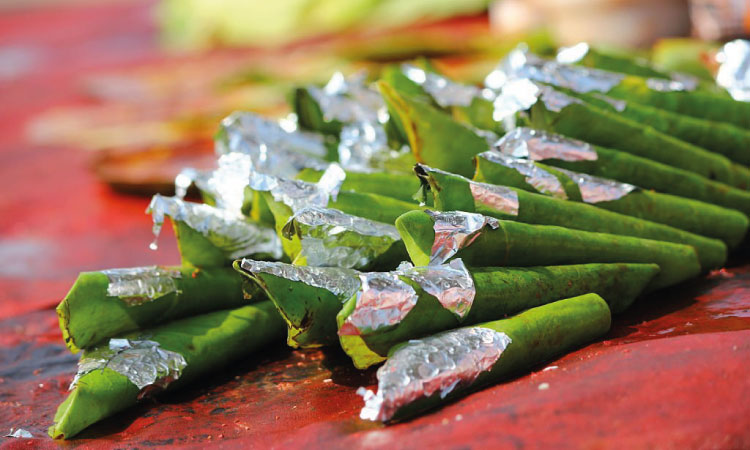Betel leaf chewing has a long-standing cultural tradition in many parts of Asia, particularly in India. A woman’s life undergoes profound transformations during pregnancy, including numerous physical and psychological changes. With these changes, come various considerations related to diet and lifestyle. One particular practice that has generated mixed opinions is the consumption of betel leaves, commonly known as paan. This blog aims to explore the implications of consuming paan (betel leaves) during pregnancy, looking at both the potential advantages and disadvantages for the mother and the unborn child.
What Are Betel (Paan) Leaves?
Betel leaves, commonly known as paan leaves, are the leaves of the betel vine (Piper betel). The leaves are heart-shaped and glossy, ranging in color from deep green to reddish-brown, depending on their maturity.
Betel leaves have been used for centuries in various cultural and traditional practices, particularly in South and Southeast Asia. They are often chewed along with other ingredients like areca nuts, slaked lime (calcium hydroxide), tobacco, and various spices. This combination is wrapped in a betel leaf to create what is commonly known as “paan.”
Paan chewing has cultural, social, and ceremonial significance in many communities. It is often offered as a symbol of hospitality, used in religious rituals, and consumed after meals as a digestive aid or mouth freshener. Paan may have different variations in its preparation and ingredients, depending on regional preferences and cultural practices.
Related Reading: Horse Gram During Pregnancy
Why Do Pregnant Women Like To Eat Paan?
Many pregnant women experience changes in cravings and taste preferences during their pregnancies. Paan’s flavor and taste are the main factors that determine whether pregnant women like it or not. Paan frequently combines various flavors, including sweet, tangy, and aromatic flavors, which may appeal to some pregnant women.
Moreover, some women, especially those from particular cultures, consume betel leaves while pregnant due to long-standing traditions in families and communities.
What Are The Effects Of Chewing Betel Leaves On Pregnancy Outcome?

Women who chewed betel quid during pregnancy had significantly higher rates of spontaneous abortion, low birth weight, and preterm birth than those who did not1.
Calculate Due Date With LMP
In some cultures, fresh betel leaves are frequently incorporated into folk medicines and have been linked to a number of potential health advantages. The importance of BL has been described in ancient books of Ayurveda. The therapeutic benefits of BL have been well-known for centuries. Betel leaves are used in Chinese folk medicine to treat a variety of ailments and are said to have detoxifying, antioxidizing, and antimutagenic properties2.
The leaves possess anti-inflammatory and antiseptic properties, which can aid in wound healing and provide relief from minor cuts and bruises. However, there has not been much scientific study specifically on the advantages of betel leaves (Piper betel) during pregnancy. Therefore, it’s essential to exercise caution during pregnancy and consult with a healthcare professional before using any herbal remedies.
Related Reading: How To Cope With Sweet Cravings During Pregnancy
The following are some possible advantages of betel leaves that have been researched in general contexts and may be advantageous for pregnancy:
- Mild stimulant: Betel leaves contain compounds like alkaloids that act as mild stimulants3, which can lead to increased alertness and reduced fatigue. Women who are pregnant experience fatigue more frequently, and chewing one betel leaf may be helpful
- Analgesic effects: Some research indicates that betel leaves may have mild pain-relieving properties, making them potentially useful in alleviating minor pains and headaches4
- Breath freshener: Betel leaves have been used traditionally for their antimicrobial properties and as a natural mouth freshener. Chewing fresh betel leaves during pregnancy, with certain ingredients like cardamom or cloves may help improve breath odor by fighting oral bacteria, and improving overall oral hygiene
- Digestive aid: In some traditional practices, chewing betel leaves is believed to aid digestion5, and alleviate digestive discomfort. The leaves of betel have a natural tendency to increase appetite; they improve digestion, and they relieve constipation during pregnancy
- Respiratory health: Betel leaves are believed to have bronchodilator properties, which means they may help ease respiratory conditions like asthma, and bronchitis6
- Antimicrobial properties: Betel leaves have shown antimicrobial properties against certain bacteria and fungi7. They have been used traditionally to help combat infections. So you can occasionally try betel leaf for coughing during pregnancy
- Blood sugar regulation: There is some evidence suggesting that betel leaves may have a hypoglycemic effect. The anti-hyperglycemic properties of betel leaves work to control the problem of sugar. Betel leaves prevent the amount of glucose in the blood from increasing8. However, more research is needed in this area
During pregnancy, it’s essential to prioritize safety and follow the advice of healthcare professionals. Although it has some general benefits, it’s better to avoid betel leaves during early pregnancy.
- Herbal remedies, including betel leaves, may not be safe for consumption during pregnancy due to potential adverse effects on the developing fetus
- Betel leaves also contain compounds called alkaloids, especially in the betel quid (a mixture containing areca nut, slaked lime, and other ingredients), which can have potential adverse effects on health, especially during pregnancy
- Preparations/home remedies made from betel leaves may also interact with drugs or have unintended consequences when used during pregnancy
To address any health issues you may have while pregnant, always choose safe, research-backed options. And that should also be done with medical supervision.
What Are The Disadvantages Of Eating Paan During Pregnancy?

While it has been associated with certain potential benefits, it’s important to note that chewing betel leaves is also associated with significant health risks, especially when combined with other ingredients like areca nut and slaked lime to create a mixture known as betel quid. It is not advised to consume betel leaves on a regular basis while pregnant because doing so can result in folate deficiency and pregnancy complications.
Following are some of the side effects of eating betel leaf during pregnancy:
- It can increase the risk of cancer: The World Health Organization (WHO) has classified betel quid with tobacco as a Group 1 carcinogen for humans9. Long-term use of betel quid has been associated with an increased risk of oral cancer, esophageal cancer, and other cancers of the digestive tract10
- Oral health issues: Chewing pan, especially when combined with other ingredients like areca nut and slaked lime, can cause discoloration of teeth and gums and may lead to oral health problems, including gum disease11. The risk of getting mouth sores increases when betel leaves are chewed occasionally. There are times when recovery can be very slow. This could hinder eating
Related Reading: Can Dental Problems Cause Miscarriage?
- Gastrointestinal issues: Chewing paan that contains tobacco can cause gastric distress. There is evidence that chewing tobacco harms gastric mucosa. The mucous membrane lining the stomach is known as the gastric- mucosa12. Betel quid consumption can irritate the digestive tract and lead to stomach pain, nausea, and vomiting
- Addiction: Betel quid contains areca nut, which is a psychoactive substance and can be addictive13. Frequent consumption can lead to dependence, making it challenging for users to quit the habit
- Adverse pregnancy outcome: Betel quid use during pregnancy has been associated with adverse outcomes, including low birth weight and premature birth14
- Risks of tobacco use: When tobacco is added to paan, dopamine levels increase. Hypertensive disorders of pregnancy such as preeclampsia and gestational hypertension have been associated with dopamine inactive metabolites, monoamine oxidase (MAO), and catechol-O-methyl transferase (COMT)15. Thus, regular consumption of paan with tobacco can have a negative impact on the healthy progression of pregnancy
According to Our Nutritionist Sushree, it is common for pregnant women to experience cravings and to feel like eating unusual things during their pregnancies. But you should be aware that not all cravings can be satisfied. The preparation of Betel leaves(paan) combines various ingredients that are believed to aid digestion and other health benefits but some research has been linked to low birth weight in developing fetus, low oxygen supply from mother to fetus, and an increased risk of other complications. Long-term use of betel leaves have been associated with carcinogenic effect(oral), shortness of breath, increase in blood pressure and heart rate. Betel leaves(paan) are often sold with various flavorings and additives that may contain harmful chemicals that can be risky during pregnancy. Occasional consumption of betel leaves without tobacco or other harmful additives might not be harmful during pregnancy. But as Pregnancy is a time when the body is vulnerable to complications, it is therefore, best to avoid consuming betel leaves(paan) in order to ensure the health and well-being of your unborn child.
FAQ’s
Gulkand (a sweet preserve made from rose petals), is considered a fantastic tonic for expectant mothers. While occasionally using Gulkand Paan is acceptable, it is generally not advised to do so while pregnant because it contains betel leaves and other ingredients.
It is best to avoid eating sweet supari (betel nut) during pregnancy due to its potential adverse effects on both the mother and the baby. Betel nut contains alkaloids that may pose risks to pregnancy and can have detrimental effects on fetal development.


